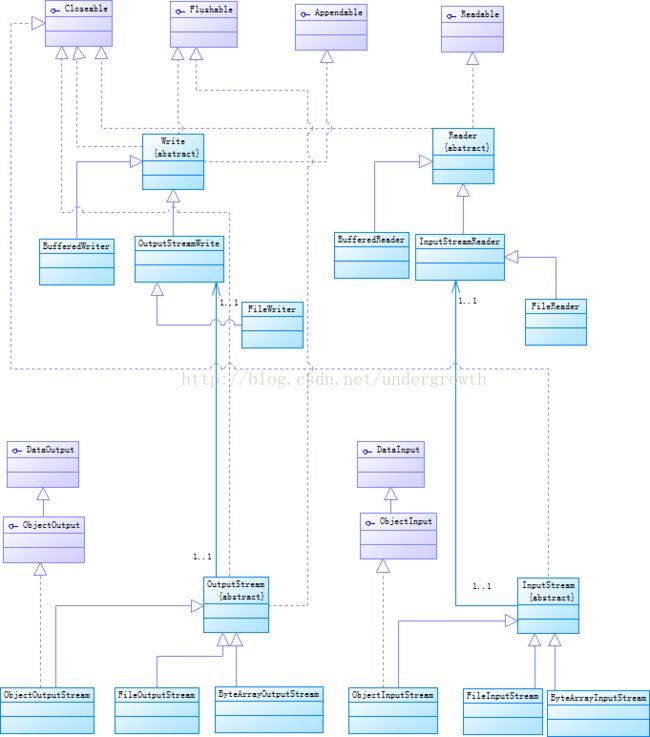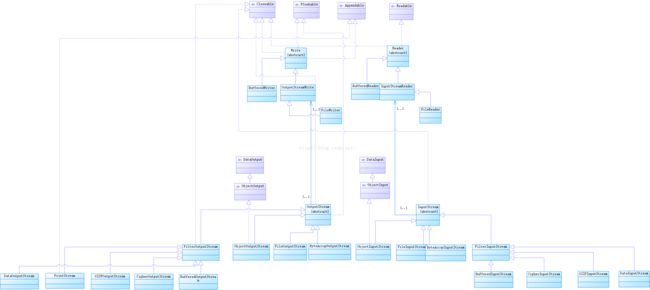OutputStream、InputStream、Writer、Reader学习笔记
学习java.io类库
使用PD画了一张java.io的主要类库 如下
主要的就是字节流与字符流
字节流以OutputStream、InputStream
字符流以Writer、Reader
字节流与字符流的桥梁为OutputStreamWriter、InputStreamReader
缓冲字符流的为BufferedWriter、BufferedReader
2015-9-27 修改
字符流与字节流从上层往下看的时候 只要把顶层的几个接口相关的方法 了解了 其他的 就比较简单了
字节输入流与字节输出流的测试
/**
*
*/
package com.undergrowth.io;
import java.io.ByteArrayOutputStream;
import java.io.File;
import java.io.FileInputStream;
import java.io.FileNotFoundException;
import java.io.FileOutputStream;
import java.io.IOException;
import java.io.InputStream;
import java.io.ObjectInputStream;
import java.io.ObjectOutputStream;
import java.io.OutputStream;
import java.io.PrintStream;
import java.util.Calendar;
import java.util.Locale;
import org.junit.Test;
/**
* 输出流学习笔记
* OutputStream(抽象类)
* -->FileOutputStream
* -->ObjectOutputStream(在SerializableLearn中进行测试)
* -->ByteArrayOutputStream
*
* 输入流学习笔记
* InputStream
* -->FileInputStream
* -->ObjectInputStream
* -->ByteArrayInputStream
* @author Administrator
*
*/
public class OutputInputStreamLearn {
/**
*
*/
public OutputInputStreamLearn() {
// TODO Auto-generated constructor stub
}
//输出路径
String pathname="d:\\log\\";
File filePath=new File(pathname);
OutputStream osStream=null;
ObjectOutputStream ooStream=null;
InputStream isStream=null;
ObjectInputStream oisStream=null;
//测试输出的字符串
String testOutString="测试输出的FileOutputStream字符串";
byte[] b=new byte[testOutString.getBytes().length];
/**
* 测试输出流数据
* 文件输出流-->用于将文件写入File或FileDescriptor的输出流
*/
@Test
public void testFileOutputStream(){
isFileExist(filePath);
filePath=new File(filePath, getFileName());
try {
osStream=new FileOutputStream(filePath);
osStream.write(testOutString.getBytes());
osStream.flush();
} catch (FileNotFoundException e) {
// TODO Auto-generated catch block
e.printStackTrace();
} catch (IOException e) {
// TODO Auto-generated catch block
e.printStackTrace();
}finally{
closeOutStream(osStream);
}
}
/**
* 测试文件输入流
*/
@Test
public void testFileInputStream(){
isFileExist(filePath);
filePath=new File(filePath, getFileName());
try {
isStream=new FileInputStream(filePath);
isStream.read(b);
System.out.println(new String(b));
} catch (FileNotFoundException e) {
// TODO Auto-generated catch block
e.printStackTrace();
} catch (IOException e) {
// TODO Auto-generated catch block
e.printStackTrace();
}finally{
closeInStream(isStream);
}
}
/**
* 测试对象输出流
*/
@Test
public void testObjectOutputStream(){
isFileExist(filePath);
filePath=new File(filePath, getFileName());
try {
osStream=new FileOutputStream(filePath);
ooStream=new ObjectOutputStream(osStream);
ooStream.writeObject(testOutString);
ooStream.flush();
osStream.flush();
} catch (FileNotFoundException e) {
// TODO Auto-generated catch block
e.printStackTrace();
} catch (IOException e) {
// TODO Auto-generated catch block
e.printStackTrace();
}finally{
closeOutStream(ooStream);
closeOutStream(osStream);
}
}
/**
* 测试对象输入流
*/
@Test
public void testObjectInputStream(){
isFileExist(filePath);
filePath=new File(filePath, getFileName());
try {
isStream=new FileInputStream(filePath);
oisStream=new ObjectInputStream(isStream);
String resultString=(String) oisStream.readObject();
System.out.println(resultString);
} catch (FileNotFoundException e) {
// TODO Auto-generated catch block
e.printStackTrace();
} catch (IOException e) {
// TODO Auto-generated catch block
e.printStackTrace();
} catch (ClassNotFoundException e) {
// TODO Auto-generated catch block
e.printStackTrace();
}finally{
closeInStream(oisStream);
closeInStream(isStream);
}
}
/**
* 关闭输出流
* @param osStream2
*/
private void closeOutStream(OutputStream osStream2) {
// TODO Auto-generated method stub
if(osStream2!=null){
try {
osStream2.close();
} catch (IOException e) {
// TODO Auto-generated catch block
e.printStackTrace();
}
}
}
/**
* 关闭输入流
* @param osStream2
*/
private void closeInStream(InputStream isStream) {
// TODO Auto-generated method stub
if(isStream!=null){
try {
isStream.close();
} catch (IOException e) {
// TODO Auto-generated catch block
e.printStackTrace();
}
}
}
/**
* 判断文件是否存在
* @param filePath2
*/
private void isFileExist(File filePath2) {
// TODO Auto-generated method stub
if(!filePath2.exists()) filePath2.mkdir();
}
/**
* 获取文件名
* @return
*/
private String getFileName() {
// TODO Auto-generated method stub
Calendar calendar=Calendar.getInstance(Locale.CHINA);
String fileName=calendar.get(Calendar.YEAR)+"_"+(calendar.get(Calendar.MONTH)+1)+"_"+calendar.get(Calendar.DAY_OF_MONTH)+"_"+OutputInputStreamLearn.class.getSimpleName()+".txt";
return fileName;
}
/**
* 测试字节数组输出流
* ByteArrayOutputStream-->将构建一个缓冲区,将数据写入字节数组
*/
@Test
public void testByteArrayOutputStream(){
int size=1000;
ByteArrayOutputStream byteArrayOutputStream=new ByteArrayOutputStream(size);
try {
byteArrayOutputStream.write(testOutString.getBytes());
System.out.println(new String(byteArrayOutputStream.toByteArray()));
//使用平台默认的字符集将字节码转换为字符串
System.out.println(byteArrayOutputStream.toString());
} catch (IOException e) {
// TODO Auto-generated catch block
e.printStackTrace();
}finally{
closeOutStream(byteArrayOutputStream);
}
}
/**
* 打印各种数据值的表现形式
*/
@Test
public void testPrintStream(){
PrintStream psStream=new PrintStream(System.out);
psStream.append('Q');
psStream.println();
psStream.print(true);
psStream.println();
try {
psStream.write(testOutString.getBytes());
} catch (IOException e) {
// TODO Auto-generated catch block
e.printStackTrace();
}
}
}
字符流的输入、输出
package com.undergrowth.io;
import java.io.BufferedReader;
import java.io.BufferedWriter;
import java.io.File;
import java.io.FileReader;
import java.io.FileWriter;
import java.io.IOException;
import java.io.PrintWriter;
import java.io.Reader;
import java.io.Writer;
import java.util.Calendar;
import java.util.Locale;
import org.junit.Test;
/**
* 字符流学习笔记
* Writer-->字符流写
* -->BufferedWriter
* -->OutputStreamWriter
* -->FileWriter
* -->PrintWriter
*
* Reader-->字符流读
* -->BufferedReader
* -->LineNumberReader
* -->InputStreamReader
* -->FileReader
*
* @author Administrator
*
*/
public class WriterReaderLearn {
public WriterReaderLearn(){}
/**
* 测试字符流写
* 使用BufferedWriter进行缓冲字符流
*/
@Test
public void testWriter(){
PrintWriter pwWriter=null;
isFileExist(filePath);
filePath=new File(filePath, getFileName());
try {
pwWriter=new PrintWriter(new BufferedWriter(new FileWriter(filePath)));
pwWriter.write(testOutString);
pwWriter.flush();
} catch (IOException e) {
// TODO Auto-generated catch block
e.printStackTrace();
}finally{
closeWriter(pwWriter);
}
}
/**
* 测试字符流读
* 使用BufferedReader进行缓冲字符流
*/
@Test
public void testReader(){
BufferedReader brReader=null;
isFileExist(filePath);
filePath=new File(filePath, getFileName());
try {
StringBuilder builder=new StringBuilder();
String tmpString=null;
brReader=new BufferedReader(new FileReader(filePath));
while ((tmpString=brReader.readLine())!=null) {
builder.append(tmpString);
}
System.out.println(builder.toString());
} catch (IOException e) {
// TODO Auto-generated catch block
e.printStackTrace();
}finally{
closeReader(brReader);
}
}
//输出路径
String pathname="d:\\log\\";
File filePath=new File(pathname);
//测试输出的字符串
String testOutString="测试输出的WriterReaderLearn字符串";
/**
* 关闭读字符流
* @param reader
*/
private void closeReader(Reader reader){
if(reader!=null){
try {
reader.close();
} catch (IOException e) {
// TODO Auto-generated catch block
e.printStackTrace();
}
}
}
/**
* 关闭写字符流
* @param writer
*/
private void closeWriter(Writer writer){
if(writer!=null){
try {
writer.close();
} catch (IOException e) {
// TODO Auto-generated catch block
e.printStackTrace();
}
}
}
/**
* 判断文件是否存在
* @param filePath2
*/
private void isFileExist(File filePath2) {
// TODO Auto-generated method stub
if(!filePath2.exists()) filePath2.mkdir();
}
/**
* 获取文件名
* @return
*/
private String getFileName() {
// TODO Auto-generated method stub
Calendar calendar=Calendar.getInstance(Locale.CHINA);
String fileName=calendar.get(Calendar.YEAR)+"_"+(calendar.get(Calendar.MONTH)+1)+"_"+calendar.get(Calendar.DAY_OF_MONTH)+"_"+WriterReaderLearn.class.getSimpleName()+".txt";
return fileName;
}
}

